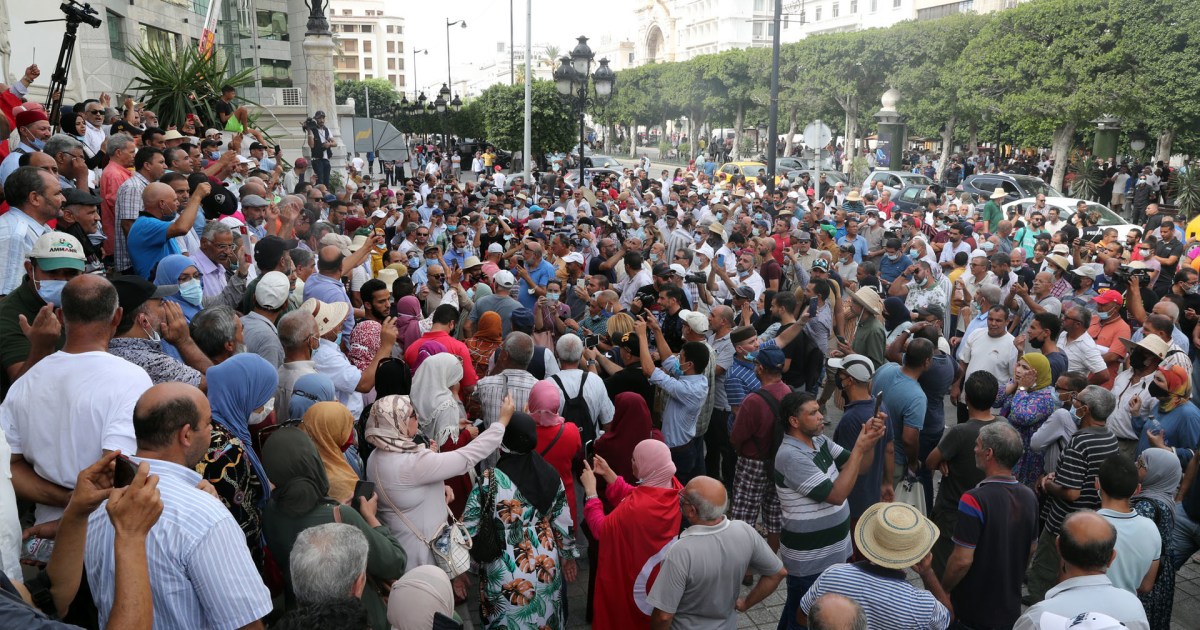Demonstrators in the Tunisian capital rejected the exceptional measures announced by President Kais Saied last July 25, which included freezing the work of Parliament and dissolving the government, while the Tunisian Labor Union renewed its call for the president to expedite the formation of the government.
On Saturday, the demonstrators called for the restoration of the constitution and the activation of constitutional institutions, especially Parliament.
The protesters raised slogans calling for preserving the gains of the Tunisian revolution, especially freedoms, which they say have become threatened in light of the security and military prosecutions of a number of opponents of the Tunisian president.
This follows calls from Tunisian activists to protest against what they call a coup against legitimate institutions and the country's constitution.
The gathering of protesters - which included activists, human rights activists and Tunisian politicians - began in front of the Municipal Theater on the main Habib Bourguiba Street (in the center of the capital).
The demonstrators raised slogans, the most important of which were "No retreat from legitimacy," "No coup against state institutions," "No fear, no terror. The authority belongs to the people," and "Constitution, freedom, national dignity."
# Tunisia is recovering. The
people want to overthrow the coup. The
coup # Qais_Said pic.twitter.com/FPhmf2MbFw
— Mohamed Zayani (@MZAYANISf) September 18, 2021
"Every day that passes proves that President Saeed is floundering and pushing the country into the unknown," said a protester in his fifties from Al-Khadra neighborhood, near the capital.
The French Press Agency stated that among the participants in the demonstration were figures from the Ennahda movement, the largest party represented in the frozen People's Assembly (Parliament), as well as supporters of the Dignity Coalition, an ally of the Ennahda movement, along with some left-wing figures.
Former Tunisian President Moncef Marzouki said in an interview with Al Jazeera that Saturday's demonstrations against President Said's decisions confirm that the Tunisian people imposed their freedom, adding that the only way out of the crisis is that "the president submits to the people's requests, resigns, or is fired."
counter-demonstration
On the other hand, dozens of supporters of President Kais Saied organized another protest in the same street, and raised a number of slogans calling for the dissolution of Parliament and attacking its speaker, Rached Ghannouchi, Secretary-General of the Ennahda Movement.
"They are only here to defend their personal interests...and to defend the corrupt and the Islamists," said Muhammad Salim, who was standing with his son in the counter-protest.
The protest was accompanied by a heavy police presence, and Reuters said, "Today's protests may give an indication of how the security services - of which Saeed appointed many of their leaders recently - will deal with the popular opposition."
"The police seem to treat the protesters, supporters and opponents equally, as they stand between the two teams in front of the Municipal Theater on Habib Bourguiba Street," she added.
On the other hand, the Assistant Secretary-General of the Tunisian Labor Union, Sami Tahiri, confirmed that the union demanded the President of the Republic to expedite the formation of the government. Two peoples, as he put it.
The Assistant Secretary-General of the Tunisian Labor Union, Sami Tahiri, confirmed that the union affirms that protest is a right, but that it rejects any protest if it is for the sake of dividing Tunisians and creating two peoples.
labor union
The leader of the union, which is the most powerful union organization in Tunisia, said that the labor union is not concerned with the protest movements that were organized on Saturday on Habib Bourguiba Street, and that it did not and will not participate in any other moves against it.
Al-Tahri added that the union warned of the slipping into violence, because issues are resolved by consultation - according to his description - calling for an end to the exceptional procedures.
After weeks of President Saied's extraordinary decisions, uncertainty prevails in Tunisia about the political situation, the system of government, and the fate of the current constitution.
Saeed had pledged that he would act within the framework of the constitution, but said that he might amend some of its chapters, at a time when several parties announced their opposition to any plans to abolish it.
The Tunisian president is facing pressure to announce a specific agenda for managing the next phase, including the expected political reforms, and the formation of a government as soon as possible to carry out its executive tasks and devote itself to the economic crisis.

